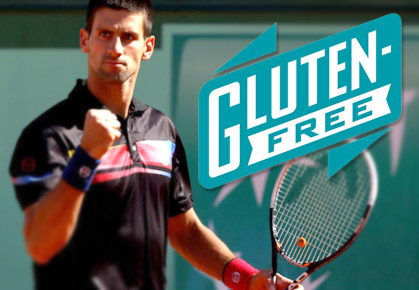By James Waterson
 (May 27, 2011) As tennis journalists and writers struggle to explain Novak Djokovic’s success this year, the Serb’s new-found gluten-free diet has recently factored into the conversation.
(May 27, 2011) As tennis journalists and writers struggle to explain Novak Djokovic’s success this year, the Serb’s new-found gluten-free diet has recently factored into the conversation.
It may seem odd to think that a professional athlete, particularly one of the best tennis players in the world and a Grand Slam champion, needs to go on a diet.
Yet for the 24-year-old Serb, it was a necessary move. At the end of 2010, his nutritionist discovered he was allergic to gluten, a protein commonly found in wheat products such as bread and other wheat products.
His nutritionist switched his diet, and the rest is history: he’s won 40 consecutive matches in 2011, seven titles, and he’s beaten top 10 competition 13 times. He’s also won 89 percent of his service games, 43 percent of his return games and half of his break point opportunities.
To top it off, he could take the World No. 1 spot from Rafael Nadal if he makes the French Open final.
So how has his new diet helped?
People with a gluten allergy, also known as Celiac disease, who eat foods containing gluten experience an immune reaction in their small intestines, causing damage and an inability to absorb nutrients, according to the Mayo Clinic.
That can translate into a number of symptoms, including fatigue, joint pain, abdominal bloating and pain, recurring diarrhea and other symptoms, according to the University of Chicago Celiac Disease Center.
A gluten-free diet avoids foods such as candy, cake, bread, processed lunch meats, oats, sauces (including soy sauce), pastas and soups, according to the Mayo Clinic.
However, rice, gluten-free flours such as corn, soy, or potato, cornmeal, tapioca and quinoa are fair game. Unprocessed meats,
vegetables, fruits and dairy products are still allowed, as well.
Aside from his great results, since Djokovic switched to this diet he said he's feeling much better on court. “I have lost some weight but it's only helped me because my movement is much sharper now and I feel great physically,” he said to the Daily Mirror in April.
He's not the only one who is switching to a gluten-free diet. Sabine Lisicki, the 21-year-old German who had Vera Zvonareva on the ropes before she was thwarted by cramps, recently discovered that she is allergic to gluten as well.
She seems to have not been able to adjust to her new diet, as she said pasta is one of her biggest sources of energy.
“My body needs to adjust to the big change and needs some time. It’s good that we found out and it will only make life better in the long run!” Lisicki wrote on her website.
A gluten-free diet isn't just for people with Celiac disease, but the Mayo Clinic warns that if you're going to try it, you should consider how the absence of enriched breads will limit your vitamin intake.
You could miss out on essentials such as iron, calcium, fiber, or niacin, and you should consult a nutritionist to make sure you're getting enough of what you need.
But if you want to give it a shot, you can look here for a database of gluten-free recipes.